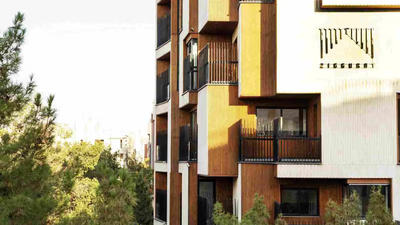
Explore the dynamic residential apartment market in the Middle East.
The market of buying and selling and renting residential apartments in the region of West Asia and the Middle East may be affected by various factors such as economic, political, social changes and real estate laws. The international market of residential apartments in the Middle East and West Asia is a dynamic and multiple market that is affected by several factors. These changes can have a direct impact on prices, demand and supply in the market. The region of West Asia and the Middle East includes various countries and cities. In some cities and countries, the residential property market is more prosperous and there are more suitable investment opportunities. For example, cities such as Dubai in the United Arab Emirates , Doha in Qatar , and Tehran in Iran are known as financial and business centers with dynamic housing markets.
The price of residential apartments in West Asia and the Middle East may vary depending on the region, city and neighborhood, the size and facilities of the apartment, the market situation and other factors. Some cities in this region have a hot housing market and investment potential, while in other areas there may be a cold market and falling prices. Real estate laws and financial and ownership regulations may differ in each country and region. Some countries have strict restrictions and regulations regarding buying and selling or renting property for foreigners. Before any investment in the desired area, it is necessary to carefully study the real estate laws and related regulations.
The rules and regulations related to buying, selling and renting property in each country and region may be different. Some countries have strict restrictions and regulations regarding foreign investment in the housing market. The housing market in the Middle East and West Asia includes various countries and cities. Each country and city has specific local conditions that can have a direct impact on prices, demand and supply in the market. Researching the local market, analyzing economic, political, and social factors, and interacting with local experts can help you better understand the market.
In the Middle East and West Asia, some famous areas are known as real estate investment destinations. For example, cities such as Dubai in the United Arab Emirates, Doha in Qatar, Riyadh and Jeddah in Saudi Arabia, and Istanbul in Turkey are known as attractive investment areas in this region. If you are planning to invest in a foreign market, it can be very useful to check the attractive areas and analyze the investment opportunities in them. Various factors can affect the market of residential apartments in these areas. These factors include economic, political, security, demand and supply changes, exchange rate changes, infrastructure development, economic status of countries, property market status and other factors. Examining these factors and analyzing them can help you predict the market situation.
Urban growth and infrastructure development in the Middle East and West Asia can have a significant impact on the housing market. Investing in areas that are developing and growing and have improved infrastructure (such as transportation, shopping centers, educational and health centers, etc.) can create attractive investment opportunities. For the best information and guidance on the international market of residential apartments in the Middle East and West Asia, you can refer to the services of real estate consultants specializing in this region. Local real estate agents can provide more comprehensive information about the housing market, local laws, investment opportunities, and other important points.
-

The residential apartment market in the Middle East and West Asia is influenced by various economic, political, and social factors. Cities like Dubai, Doha, and Tehran are notable for their dynamic housing markets, offering diverse investment opportunities. Prices vary significantly based on location, size, amenities, and market conditions. Some areas experience a booming housing market while others face declining prices. Real estate laws differ across countries, with some imposing strict regulations on foreign investments. Understanding local regulations is crucial before making any investment decisions. Additionally, urban growth and infrastructure development play a vital role in shaping the housing market landscape. Areas with improved infrastructure tend to attract more investment due to their potential for growth. Engaging with local real estate experts can provide valuable insights into market trends and legal requirements, helping investors navigate this complex environment effectively.
-

Effective marketing strategies for selling residential apartments to foreign buyers in the Middle East and West Asia include collaboration with local agents, creating professional websites, and utilizing online and local advertising. Local agents can conduct property tours, provide essential information, and leverage their networks to attract buyers. A well-designed website showcasing high-quality images and comprehensive property details is crucial. Online marketing methods such as Google Ads and social media campaigns can enhance visibility. Participation in industry exhibitions offers opportunities to connect with potential buyers directly. Additionally, local advertising through media channels can reach both local and foreign audiences. Notable property developers in the region include Emaar Properties, Damac Properties, ENSHAA, Azizi Developments, Mabanee Company, Aldar Properties, and Alargan International Real Estate Company. Collaborating with experienced real estate consultants ensures compliance with local laws while providing valuable support to foreign buyers throughout the purchasing process.
Offering reliable after-sales service fosters trust and satisfaction among clients. Understanding cultural nuances and language barriers is essential for effective communication with foreign buyers.
-

The Middle East and West Asia feature cities with advanced infrastructure and significant economic growth, making them attractive for residents and immigrants. These urban centers offer diverse job opportunities, excellent services in transportation, health, education, and recreation. Cultural diversity enhances the living experience, with various languages and international cuisines available. Key cities include Dubai, known for its business environment; Tehran, rich in culture despite challenges; Tel Aviv, a tech hub; Riyadh, an economic center; Doha with its modern architecture; Muscat"s natural beauty; Beirut"s historical charm; and Istanbul"s cultural significance. Political stability varies across the region, impacting real estate decisions for potential buyers or renters. Understanding local laws is crucial for foreigners considering property investments. The choice between buying or renting depends on individual preferences regarding lifestyle and financial factors. While some cities have high living costs, they also offer investment potential in real estate.
Overall, the region presents a blend of modernity and tradition that appeals to many. "
-

Investing in residential property in West Asia poses significant risks due to various factors. Countries like Syria and Yemen are heavily affected by ongoing conflicts, leading to destruction, economic collapse, and severe humanitarian crises. Iraq faces post-war instability with high unemployment and security threats, while Lebanon is grappling with hyperinflation and political turmoil. The Gaza Strip suffers from economic blockades and poor living conditions, making it unattractive for investment. Afghanistan"s recent political upheaval has resulted in widespread poverty and security risks, deterring potential investors. Libya remains divided with ongoing civil conflict, creating unsafe living conditions. Additionally, countries like Saudi Arabia and Iran have human rights issues that complicate investment prospects. Political instability across the region leads to uncertainty for investors, while economic problems such as inflation and legal restrictions further diminish confidence in property investments.
Thorough research is essential for potential investors to identify safer regions with more stable environments. "




